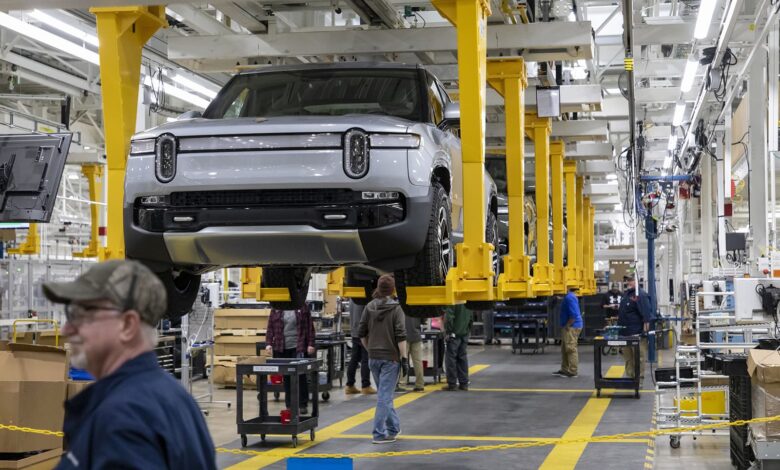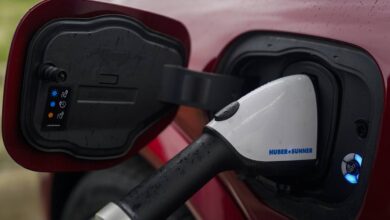EV startups Rivian, Lucid, Nikola attempt to shore up cash

R1T trucks on the assembly line at the Rivian electric vehicle plant in Normal on April 11, 2022.
Brian Cassella | Tribune News Service | Getty Images
Executives of Rivian Automotive, Lucid Group and Nikola Corp. this week each detailed plans to reduce costs while attempting to grow operations and make their first profits. Those efforts have ranged from job cuts and production changes to supplier rearrangements and shifting priorities.
The scramble comes as EV adoption takes hold slower than many expected and after companies spent billions in an attempt to rush vehicles to market to gain first-mover advantages in white-space segments.
The slowdown, as well as the increased competition, has even impacted U.S. EV leader Tesla, which is in the midst of a global restructuring that includes laying off roughly 10% of its workforce.
Wall Street analysts have referred to the current state of the electric vehicle market as an “EV winter,” an end to so-called EV Euphoria or, more optimistically, a temporary pullback that carmakers will need to overcome for long-term gains.
“US EV adoption likely entered an air pocket after having penetrated initial adopters & specific regions,” Citi analyst Itay Michaeli wrote in a Thursday investor note. “The situation will not change overnight, but we see reason for optimism over the next 12-18 months.”
See Chart…
Performance of Rivian, Lucid and Nikola stocks over the past year.
Rivian has been on a cost-cutting mission for months. It has trimmed staff, retooled its Illinois plant to increase efficiencies and paused construction of a new multibillion-dollar factory in Georgia. That last measure is expected to save more than $2.25 billion in capital spending, including the impact of starting production of Rivian’s next-generation R2 vehicle at its current plant in Normal, Illinois.
Rivian reported $7.86 billion in cash, cash equivalents and short-term investments to end March, with more than $9 billion in total liquidity.
Lucid, for its part, ended the first quarter with approximately $4.6 billion in cash, cash equivalents and investments, with total liquidity of approximately $5.03 billion.
Lucid CEO Peter Rawlinson said he’s never been “more optimistic” about the startup’s future, despite notable demand issues, significant losses and capital needs. The company raised $1 billion from an affiliate of Saudi Arabia’s Public Investment Fund, its largest shareholder.
“We have identified additional opportunities in cost of goods sold, and we’ll continue to focus on implementation and further areas for cost out. Longer term, our technology will be key driver of our gross margin,” Rawlinson told investors Monday. “With scale, I believe you will see strong gross margins with efficiency the key enabler.”
Rawlinson said the $1 billion illustrated the “continued confidence and steadfast support” of the Public Investment Fund, which owns roughly 60% of the company, according to FactSet.
Rivian and Lucid both reported wider first-quarter losses than Wall Street was expecting, according to estimates compiled by LSEG.
Nikola actually beat the Street, slightly, with a 9-cent per-share loss during the first three months of the year, but revenue of $7.5 million was less than half of what analyst compiled by LSEG were anticipating.
Unlike Rivian and Lucid, Nikola is exclusively focused on commercial vehicles rather than ones to retail customers. Nikola CFO Thomas Okray said the company needs to lower its costs, while continuing to expand its sales, including potentially reducing prices for large customers in order to build scale.
“We definitely need to optimize our cost structure. No question about it,” Okray told investors Tuesday.
Nikola’s cash reserves are far lower than Lucid and Rivian. The company’s assets included $469.3 million to end the first quarter, consisting primarily of cash and cash equivalents of $345.6 million and truck inventory of $61.3 million.
Lucid Group CEO Peter Rawlinson and Derek Jenkins, senior vice president of design and brand at Lucid Motors sit on frunk of Lucid’s Gravity electric SUV during the press day preview of the Los Angeles Auto Show in Los Angeles, California, U.S. November 16, 2023.
David Swanson | Reuters
Shares of Rivian, Lucid and Nikola all trade near 52-week or all-time lows, with the stock of Nikola – once valued more than Ford Motor – trading for less than $1 per share. That puts the company at risk of being delisted from the Nasdaq, which executives are attempting to avoid through a reverse stock split that needs to be approved by shareholders.
Shares of Rivian are off about 56% this year but remain the healthiest of high-profile EV startups, most of which (other than Rivian) went public via special purpose acquisition companies, or SPACs, in the last five years.
Lucid’s stock has traded under $8 for most of the past year. The shares closed Thursday at $2.70, down more than 60% in the last 12 months.
Other EV startups such as Lordstown Motors and Electric Last Mile Solutions have gone bankrupt, while Fisker is on the verge of filing for bankruptcy and has paused vehicle production.
Lesser-known Canoo is scheduled to report its first-quarter results Tuesday. Tony Aquila, Canoo CEO and executive chairman, during the company’s fourth-quarter investor call last month said the company needs to continue to raise capital and cut costs.
“We have seen a very difficult market. We have adapted our disciplined capital deployment approach by raising only the amounts of capital we need for each milestone, and we will continue to do so,” he said.
— CNBC’s Michael Bloom contributed to this article.



